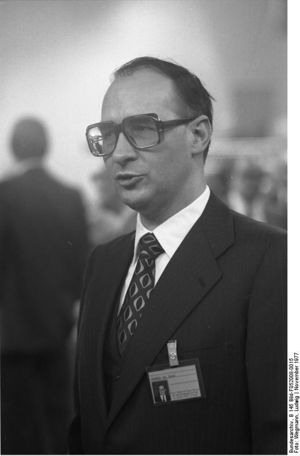Guido Brunner
(politician) | ||||||||||||||
|---|---|---|---|---|---|---|---|---|---|---|---|---|---|---|
 | ||||||||||||||
| Born | 27 May 1930 Madrid, Spain | |||||||||||||
| Died | 2 December 1997 (Age 67) Madrid | |||||||||||||
Cause of death | cancer | |||||||||||||
| Nationality | German, Spanish? | |||||||||||||
| Alma mater | University of Munich, University of Madrid | |||||||||||||
| Party | FDP | |||||||||||||
| Relatives | Hans Speidel | |||||||||||||
Attended the 1980 Bilderberg as European Commissioner for Energy Research and Science
| ||||||||||||||
Guido Brunner was a Spanish-born German diplomat and politician of the liberal Free Democratic Party. He was European Commissioner for Energy, Research and Science in the European Commission from 1977 to 1981. He was a Member of the Bundestag from 1980 to 1981, Senator for the Economy in the government of West Berlin in 1981 and Ambassador to Spain from 1981 to 1992. Tam Dalyell described him as "one of the unsung architects of the Europe we have today."[1]
He attended the 1980 Bilderberg conference
Contents
Career
Brunner was born and grew up in Madrid, where his father was a businessman. He moved to West Germany after the Second World War, where he studied law. He subsequently earned a PhD in law in Germany and a licentiate's degree in law in Spain.
Early diplomatic career
In 1955 he joined the West German diplomatic service and was posted to New York City as a member of the German delegation to the United Nations from 1960 to 1968. He was director of the press office of the Foreign Office from 1970 to 1972 and director of planning from 1972 to 1974. He headed the West German delegation to the 1973 Conference on Security and Co-operation in Europe.
European Commissioner
He was European Commissioner for Energy, Research and Science in the Jenkins Commission from 1977 to 1981. Tam Dalyell described him as "one of the unsung architects of the Europe we have today," and in particular noted his goodwill towards the United Kingdom.[1]
Career in German politics
Brunner was a member of the Bundestag from 1980 to 1981. In 1981 he served as Senator for the Economy and Deputy Mayor in the government of West Berlin.
Ambassador to Spain
Brunner left German politics to become Ambassador to his country of birth, Spain, in 1981, and served until his retirement in 1992. During his time as ambassador, he became involved in cases of corruption, such as illegal commissions from the Seat company.[2]
His management as ambassador was called into question when he was involved in several cases on which the stench of corruption floated: from the attempted transfer of the German School in Madrid, to the payment of commissions for the concession of the high-speed rail AVE. Brunner boasted that he was not "an ambassador for tea", and in private he did not hesitate to state: "All I did was take Mitterrand away from it and get half of the AVE business for Germany".
Spanish justice summoned him as a witness for having received in the embassy, in deposit, a check for 150 million pesetas from the car manufacturer Seat. Brunner stated that he did it in his capacity as consul and that it was in a convoluto (envelope), the content of which he was unaware of. The word delighted the gathering and went on to swell the lexicon related to corruption..[2]
In the months before he died, Brunner bitterly lamented being the victim of persecution by the press. German companies that had courted him for board positions slowly withdrew their trust from him and he fought in the German courts against every article he considered defamatory. .[2]
Brunner died in Madrid, at the age of 67, a victim of cancer that had been diagnosed only months before.[2]
Family
Brunner was married to Christa née Speidel, the daughter of General Hans Speidel, the Supreme Commander of the NATO ground forces in Central Europe from 1957 to 1963.[3]
Event Participated in
| Event | Start | End | Location(s) | Description |
|---|---|---|---|---|
| Bilderberg/1980 | 18 April 1980 | 20 April 1980 | Germany Aachen | The 28th Bilderberg, held in West Germany, unusually exposed by the Daily Mirror |